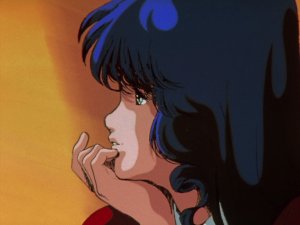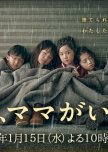If one reads anything about Ashita, Mama Ga Inai (“Tomorrow, Mama Won’t Be Here,”) that work will likely focus on the massive controversy shouldered by it. I won’t reiterate the details here; after all, there’s a great article about the situation already posted on this site. But after witnessing the drama for myself, I cannot help but wonder at all the noise. How did so many people work themselves up over what appears to be but a dark fairy tale?
Of course, that isn't to say some of the offense is incomprehensible. To the Japanese, image means a lot. It’s also impossible to control how viewers digest what they've seen on television. "Will they take it all as fact?" With Ashita, typically fantastical and almost always exaggerated, that would be worrisome indeed. But as previously mentioned, best to take it as the last shadows of a child’s dream, a bittersweet fable. Does Ashita seek to impart a worthwhile message? Certainly, and it succeeds; after all, fairy tales were born from the desire to impart morals, and dreams often contain some kernel of truth. But though we can learn from them, we know they don't fully reflect reality.
This drama rolls along a simple format, one often seen in Japanese titles. In the first half, each episode focuses on a different child and their “trials” with foster homes. This structure allows the viewer to uncover character history individually, learning about everyone at Kogamo no Ie (roughly "House of Ducklings") bit by bit. Viewers will encounter a heavy tone, with certain scenes sporting almost horror film-esque attributes. Oddly enough, the home/orphanage itself wasn't depicted as shockingly as one might assume; it was rather the potential adoptive parents themselves.
Each plot thread shares airtime in the second half, building upon and resolving what we've learned until that point. My issues with the drama began at the juncture between these two halves. If changes were indeed made by the network to sooth public tension, I've been told it would have occurred here. The story lightens, allowing for its natural humor to come out much more. Yet I found Ashita crumbling in places, culminating in at least two subplots without satisfactory resolution. There was eventually dialogue that broke my immersion, lines which felt like sermons. Despite these problems, the emotional aspect of the drama works consistently well throughout its duration. Overall an involving watch, to say the least.
Not surprisingly, most members of the Ashita, Mama Ga Inai cast are children. Ashida Mana towers above the rest with a precocious talent, her turn as Post incredible. She begins by acting like a cynical delinquent writ small, yet develops slowly into a “little mother,” to the other children; this is a child too mature for her age, yet still a child nonetheless, and Mana owns the role from top to bottom. Suzuki Rio is another powerful, budding talent, a young lady who excels at the natural expression of a normal child. Her Donki could have been written better, but she does well with what she’s given. The other kids were often hit or miss, sometimes exaggerated to a cartoonish point (Bombi, sometimes Piami), though somber scenes brought out the absolute best in them.
From the adult half of the stage, we’ve scene-stealer Mikami Hiroshi as the darkly handsome yet gruff director Sasaki Tomonori-san (better known to his charges as “Maou/Devil King”). Thundering about on a limp leg, aided by a heavy cane, this is a mysterious character whose almost esoteric motivations lend much to the thought of Ashita as a fairy tale. Is this character a wicked devil or an unexpected angel? Either way, he's wildly interesting... and that "Tch?" Unforgettable.
Like the presence of “Maou,” music bolsters the fairy tale approach of this drama. Most tracks introduce a very emotional tone to scenes, with many sounding very light or magical, often in a melancholy way. For example, the theme “Dare Ka Watashi Wo,” (Kotoringo) sounds just like a lonely lullaby.
Was this review helpful to you?























